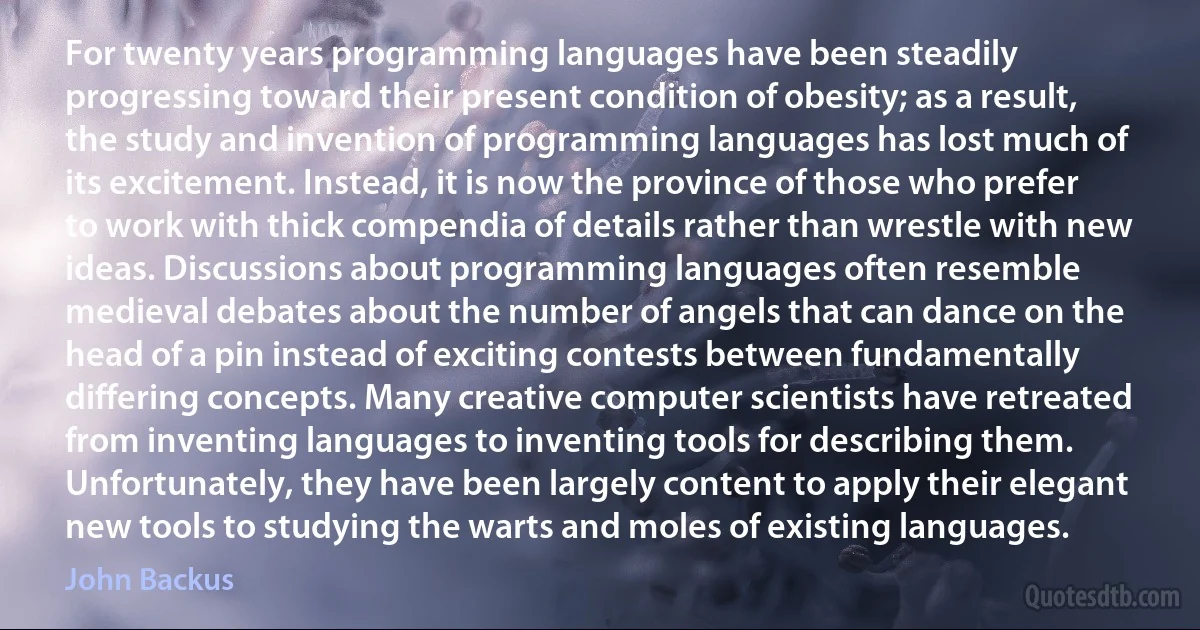
For twenty years programming languages have been steadily progressing toward their present condition of obesity; as a result, the study and invention of programming languages has lost much of its excitement. Instead, it is now the province of those who prefer to work with thick compendia of details rather than wrestle with new ideas. Discussions about programming languages often resemble medieval debates about the number of angels that can dance on the head of a pin instead of exciting contests between fundamentally differing concepts. Many creative computer scientists have retreated from inventing languages to inventing tools for describing them. Unfortunately, they have been largely content to apply their elegant new tools to studying the warts and moles of existing languages.
John BackusRelated topics
computer condition content creative dance head lost medieval now number obesity pin present province result retreated study thick twenty work years programmingRelated quotes
General systems theory, in a sense, is no news at all, as Von Foerster found out when he attempted to organize a conference of general systems people and anthropologists. In a sense, the situation is comparable to that found by the Committee for the Study of Mankind, in which a committee that included Robert Redfidd tried to get each discipline to consider its relationship to the concept of Mankind. Anthropologists replied, "we are related already," and so they were. Something similar may be said of attempts to date in mathematical anthropology. The kind of information that a computer program can finally provide, on a level of a particular culture, is simply a reflection of how detailed field work has been done, and to the careful field worker, on kinship, for example, it provides no illumination.

Margaret Mead
Justice is the end of government. It is the end of civil society. It ever has been, and ever will be, pursued, until it be obtained, or until liberty be lost in the pursuit. In a society, under the forms of which the stronger faction can readily unite and oppress the weaker, anarchy may as truly be said to reign, as in a state of nature where the weaker individual is not secured against the violence of the stronger: And as in the latter state even the stronger individuals are prompted by the uncertainty of their condition, to submit to a government which may protect the weak, as well as themselves: so in the former state, will the more powerful factions be gradually induced by a like motive, to wish for a government which will protect all parties, the weaker as well as the more powerful.

Alexander Hamilton
Don't forget that God sees you and watches you when you are in pain; He perceives even the beating of your heart. Consequently, He will not leave you without consolation and His fatherly protection. Naturally, the saints rejoiced in their afflictions; as for us, let us at least manage to accept affliction or pain patiently.
My child, pray within your heart, and the name of Jesus will become for you a comforting balm so that you can bear this trial of yours in a way which benefits you. You will greatly benefit from this trial if you submit yourself to it patiently. So again I say to you, with the almighty armor of prayer continually approach the omnipotent Lord more often, and you will come to know how He wondrously lifts the burden of pain and marvellously gives rest to sufferers.

Ephraim of Arizona
Machine-held strings of binary digits can simulate a great many kinds of things, of which numbers are just one kind. For example, they can simulate automobiles on a freeway, chess pieces, electrons in a box, musical notes, Russian words, patterns on a paper, human cells, colors, electrical circuits, and so on. To think of a computer as made up essentially of numbers is simply a carryover from the successful use of mathematical analysis in studying models. Most of this series of lectures has been devoted to applications of computers, and this is not the time to give details about their usefulness. I merely wish to point out certain types of things being done with computers today that could not have been done in 1945. Some of these are technological, some are intellectual.

George Forsythe
Bright-minded young people think poorly of existing institutions and want to abolish them. Well, one doesn't need to be young to dislike institutions. But the dreary fact remains that, even in the darkest ages, it was institutions that made society work, and if civilisation is to survive society must somehow be made to work.At this point I reveal myself in my true colours, as a stick-in-the-mud. I hold a number of beliefs that have been repudiated by the liveliest intellects of our time. I believe that order is better than chaos, creation better than destruction. I prefer gentleness to violence, forgiveness to vendetta. I believe that in spite of the recent triumphs of science, men haven't changed much in the last two thousand years; and in consequence we must still try to learn from history. History is ourselves.

Kenneth Clark
